
Cancer is not a mysterious villain. Although when looking at the big picture, it may seem like a complex disease, the fundamentals are actually quite simple. By definition, cancer is the uncontrolled growth and division of cells.
Healthy cells normally grow and divide, but cancerous cells become unregulated by the check-points your body has set in place to prevent disease. Not all cancer cells are a threat and most benign tumors can simply be removed, but uncontrolled growth can block and prevent normal, healthy functioning from occurring. Large tumors can pose an additional threat by causing increased pressure and limiting blood supply to vital organs.
When cancer becomes malignant, it is able to travel to other parts of the body and wreak havoc there. Malignancy is extremely dangerous because cancer cells steal nutrients needed for healthy tissues, causing them to starve. Some tumors can secrete hormones that can severely disturb normal hormonal balance. [1]
The Relationship Between Glucose and Cancer
In order to grow, cancer cells need nutrients. At first, it can obtain these normally from the blood around it, a hallmark of cancer is angiogenesis, which is the development of new blood vessels. Yes, cancer cells can create new blood vessels so that it can fuel itself and continue to grow larger. Glucose is a key nutrient for these cells and is brought in by the numerous numbers of blood vessels these cells have hijacked. [2]
A phenomenon known as the Warburg effect describes how cancerous cells prefer to utilize glycolysis or the breakdown of glucose for fuel even when it may seem somewhat counterintuitive. These cells can increase glucose transport receptors on their surface to increase glucose uptake. In fact, a common way to detect cancer is through testing for increased glucose breakdown. Think of glucose like kindling for a fire, the more you throw in, the larger the fire can grow, and the same principle applies to cancer. [3]
The Relationship Between Keto and Cancer
Research suggests the ketogenic diet may display anti-cancer properties through three main mechanisms:
- Glucose deprivation
- Insulin (and insulin-like growth factors) reduction
- Anti-oxidant and anti-inflammatory properties
Glucose Deprivation
Since the ketogenic diet deprives your body of glucose, it is also depriving the cancer of its main fuel source. This forces cancer cells to use a mechanism known as mitochondrial oxidation to obtain energy. However, this process leads to increased oxidative damage and stress to the cancerous cells.
Not only can this process directly harm the cancerous cells but it can also specifically sensitize these cells to damage from radiation and chemotherapy. Consuming a ketogenic diet is a way to fuel your body without fueling cancer. [4] [5]
Insulin Reduction
The hormone insulin plays an important role in supporting the growth of cells. This is why it is highly correlated with cancerous growth. Decreased insulin and insulin-like growth factor, as seen with a ketogenic diet, can decrease cancer cell growth and formation of new cells. [6] [7]
Anti-Inflammatory Properties
Ketone bodies, more specifically beta-hydroxybutyrate, displays anti-inflammatory properties. The reduction in pro-inflammatory immune cells caused by BHB may help decrease inflammation in cancer.
There is a strong association between chronic inflammation and cancer and tumor growth and inflammatory mediators. This basically means that cancer cells can regulate pro-inflammatory immune cells to promote their own growth and progression. [8] [9]
What Does the Research Say?
Although the mechanisms and biochemical understanding of a ketogenic diet for cancer therapy are well understood, there needs to be more clinical studies done to provide stronger evidence. That being said, below are case studies that provide incredible evidence for the efficacy of a ketogenic diet for cancer.
Study Breakdown
- Ten patients with cancer were placed on a ketogenic diet.
- Nine of the patients had an aggressive and rapidly progressing form of cancers.
- After less than a month, half of the patients showed their cancers had either stabilized (no longer rapidly progressing) or went into remission.
Conclusion: “Preliminary data demonstrate that an insulin-inhibiting diet is safe and feasible in selected patients with advanced cancer. The extent of ketosis, but not calorie deficit or weight loss, correlated with stable disease or partial remission.” [10]
Study Breakdown
- A 65-year-old woman with a glioblastoma multiforme was placed on a restricted ketogenic diet.
- The patient was taken off steroid medication and was supplemented with vitamins and minerals.
Conclusion: After 2 months, “the patient’s body weight was reduced by about 20% and no discernable brain tumor tissue was detected using either FDG-PET or MRI imaging.” [11]
Study Breakdown
- Two pediatric patients with advanced-stage malignant astrocytomas were placed in a ketogenic diet for eight weeks.
- Nine of the patients had an aggressive and rapidly progressing form of cancers.
- After one week, glucose uptake within the tumor had decreased by 22%.
- One patient continued the use of the ketogenic diet for an additional year and remained without disease progression.
Conclusion: One of the patients continued the ketogenic diet “exhibited significant clinical improvements in mood and new skill development during the study.” Her cancer did not progress and she is still alive, despite having such an aggressive form. [12]
Study Breakdown
- A randomized group of women with ovarian or endometrial cancer were assigned either a ketogenic diet or high-fiber, low-fat diet (American Cancer Society diet).
- After 12 weeks, body mass, and serum insulin levels were measured in both groups and shown to be lower in the ketogenic diet group.
Conclusion: The ketogenic diet improved body composition, raised beta-hydroxybutyrate (BHB) levels, and lowered insulin and IGF-1 (insulin-like growth factor-1) levels, both of which are associated with cancer proliferation. “Elevated serum ?-hydroxybutyrate may reflect a metabolic environment inhospitable to cancer proliferation.” [13]
Where Can I Learn More About the Ketogenic Diet and Cancer?
If you’d like to learn more about using a ketogenic diet for cancer/tumors, check out our friends in the keto space who have the first-hand experience:
Josh Perry @joshperrybmx
https://www.youtube.com/watch?v=n_57-s440b4
Logan Sneed @logan_fushionlean
https://www.youtube.com/watch?v=LHZpPZ107Fk
Mile Sullivan @ketomammoth
https://www.youtube.com/channel/UCzzoU_dEFbWy0zEEkLv-iCw
Chad Walkaden @chadwalkaden
References
(US), National Institutes of Health. “Understanding Cancer.” NIH Curriculum Supplement Series [Internet]., U.S. National Library of Medicine, 1 Jan. 1970
Zuazo-Gaztelu, Iratxe, and Oriol Casanovas. “Unraveling the Role of Angiogenesis in Cancer Ecosystems.” Frontiers in oncology vol. 8 248. 2 Jul. 2018, doi:10.3389/fonc.2018.00248
Epstein, Tamir et al. “The Warburg effect as an adaptation of cancer cells to rapid fluctuations in energy demand.” PloS one vol. 12,9 e0185085. 18 Sep. 2017, doi:10.1371/journal.pone.0185085
Weber, Daniela D et al. “Ketogenic diet in cancer therapy.” Aging vol. 10,2 (2018): 164-165. doi:10.18632/aging.101382
Poff, A M et al. “Ketone supplementation decreases tumor cell viability and prolongs survival of mice with metastatic cancer.” International journal of cancer vol. 135,7 (2014): 1711-20. doi:10.1002/ijc.28809
Boyd, DB. “Insulin and cancer.” Integrative cancer therapies. Vol 2,4 (2003): 315-29.
Tan-Shalaby, Jocelyn. “Ketogenic Diets and Cancer: Emerging Evidence.” Federal practitioner: for the health care professionals of the VA, DoD, and PHS vol. 34,Suppl 1 (2017): 37S-42S.
Pinto, Alessandro et al. “Anti-Oxidant and Anti-Inflammatory Activity of Ketogenic Diet: New Perspectives for Neuroprotection in Alzheimer’s Disease.” Antioxidants (Basel, Switzerland) vol. 7,5 63. 28 Apr. 2018, doi:10.3390/antiox7050063
Smyl C. “Ketogenic Diet and Cancer- a perspective.” Recent results in cancer research. Vol. 207 (2016): 233-40. doi: 10.1007/978-3-319-42118-6_11
Fine, EJ et al. “Targeting insulin inhibition as a metabolic therapy in advanced cancer: a pilot safety and feasibility dietary trial in 10 patients.” Nutrition vol 28,10 (2012): 1028-35. doi: 10.1016/j.nut.2012.05.001.
Cohen, CW et al. “A Ketogenic Diet Reduces Central Obesity and Serum Insulin in Women with Ovarian or Endormetrial Cancer.” The Journal of Nutrition. (2018).










